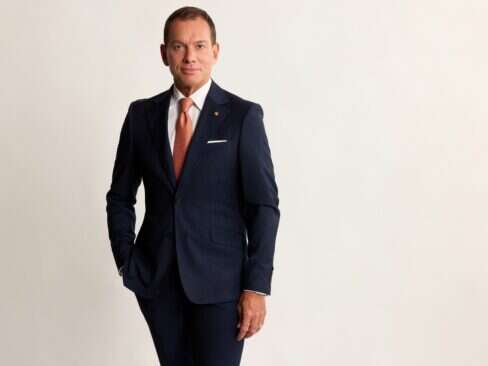Robert W. D’Loren is the Chairman and Chief Executive Officer of Xcel Brands, which owns the Isaac Mizrahi brand, last year bought Judith Ripka and holds an interest in the Liz Claiborne New York brand. The company has been a pioneer in omni-channel sales and marketing, including a partnership with QVC providing access to over 200 million global households. A former race car driver and polo player, the bold face name entrepreneur recently spoke with Elite Traveler Editor-in-Chief Doug Gollan about how he plans to weave the venerable jewelry brand into his high powered distribution network and how luxury goods will be bought and sold in the not too distant future.
Elite Traveler: Can you give us a history of how you got to this point?
Robert D’Loren: This really all started about 20 years ago as a finance company. It was a joint venture at that time between myself, Charles Koppelman, the former chairman of EMI Music and Prudential Securities. It was based on a thought that we had to take income streams associated with intellectual property, whether it be film copyrights, musical, or copyrights and structure those flows into rated bonds transactions. We started that company through Prudential Securities and we wrote the book on intellectual property, financing intellectual property securitization, and structured finance. One challenge we had to deal with was to get the ratings agencies on board. We had to develop what is known in the industry as a “backup operator platform,” which means if something went wrong in the bond deal the ratings agencies wanted to know that we could take over and operate.
Apparel was different, because a trademark is not quite a musical copyright or film copyright. So we developed the expertise to operate apparel companies. As retail consolidated and a lot of production in virtually every sector began to move offshore, control over margin in the consumer sector shifted from manufacturers to retailers. That was a very disruptive series of events in the consumer sector. In 2000 we recapped a company called Candies shoes, and we closed down its supply chain business, and we licensed the brand directly to Kohl’s. That company became Iconix brand group, which today owns 30 plus brands.
Three years ago we saw another change. That disruption is the control over margin has now shifted from retailers to consumers because of smart phones. Today, it’s all about social media. It started to change our point of view on brands as well. To drive brands socially you need dynamic active and authentic voices. They also forgot about the most important driver in the social world and that’s entertainment, more specifically, television.
ET: How did you advantage television and entertainment?
RDL: We knew the power of television, and we also knew it was the infomercial that was driving sales. Three years ago I went to see Mike George, QVC’s CEO and chairman. I asked him what he was doing to become omni. I suggested we would buy brands that have personalities that we could drive social and he would sell on his network. Then we made that deal with QVC. Today we have three brands with QVC including Liz Claiborne New York, Isaac Mizrahi, Judith Ripka. The company has grown from $50 million in sales to roughly $450 million in three years.
ET: So the ways of retail are shifting significantly?
RDL: These are the new rules of retail, and that’s the way it works. I think of us as a heard of gazelles as opposed to an 800 pound gorilla. We move with our partners. We move with our licensing partners and our retail partners, and, frankly, our celebrity partners. It’s one movement at the same time together. Our job is to keep it all coordinated.
ET: And what’s the impact on going to the store?
RDL: We don’t think bricks and mortar shopping going away. We think people will always want that experience. But we do see more shoppers moving to online. We believe in television and online convergence, a true interactive TV, within the next 24 months.
ET: What would be an example of that?
RDL: There will be a time when we will watch a show, and at the bottom of the screen you’ll wave your hand, and all the products that are being worn and all the furniture in the set will be available for sale. You’ll say to your television, search all brands for that red dress in my size. Then you’ll scroll and be able to shop.
ET: So within 24 months if I turn on a sitcom this will be an option?
RDL: It’s all a matter of time. Look at what’s coming from Twitter and Facebook. Twitter is now testing the ‘buy it now’ button. So think about someone like Shakira, who is the fourth most followed person on the planet. When she takes a selfie she posts the brand of her, shoes, bottom, top, bag, and posts it to Facebook. Then the followers can buy it.
ET: Will this model work for luxury products?
RDL: I think people’s comfort with buying luxury items online will increase over time. It’s all about trust, and there are some interesting models that are sort of hybrids. There’s an interesting jewelry company in the market today called Ritani. Ritani is an online business and you can buy an engagement ring but what they do is that you can order it online but you pick it up a local jeweler who is a Ritani affiliate. But there will come a time where the customer will be confident enough in companies like that to just buy from them.
ET: How does Judith Ripka fit into this vision?
RDL: Judith has been an absolutely brilliant designer for the past 30 years and an accomplished entrepreneur. She had eight retail stores around the country all positioned as luxury stores. Our strategy for Judith is to take it back a little to go forward. We needed to close non-performing stores. The plan is to continue to operate the Madison Avenue store and the East Hill (Long Island) store to reposition the brand back into best retail distribution so Neiman Marcus, Saks, Bloomingdales, which we’ve done.
Judith and QVC work very well together. We’re a leading jewelry brand for them. I think one of the incredible things about our jewelry business on QVC is our price points are from $150 to a high of $3,500. Twenty percent of our business is in items over $1,500, which I think speaks to the consumer’s willingness and understanding of the value of Judith Ripka’s Jewelry.
ET: Are there opportunities to expand Judith Ripka beyond jewelry?
RDL: Watches, footwear, handbags and accessories are part of the plan.
ET: Any other acquisitions on the horizon?
RDL: We’re not an acquisitive company. We have a very strong organic growth potential here. We have acquired two brands in the last three years. The answer is if there is an opportunity that is strategic to us, which means that it has to help us grow in the channels that we’re in it is a possibility.











